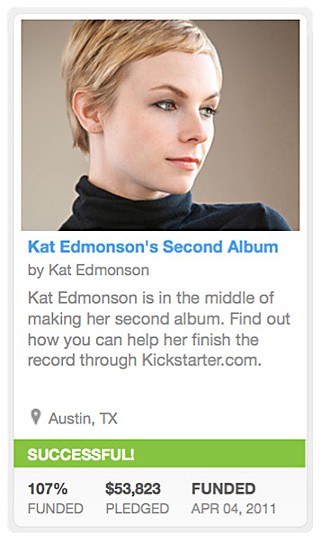Kickstart My Heart
Austin figures prominently in Kickstarter's risks and rewards
By Adam Schragin, Fri., Feb. 24, 2012
Justin Kazmark, from the communications team for Manhattan-based Internet start-up Kickstarter, speaks on the phone about his company's growth and how a once three-person team has very recently increased to 37. Discussing Austin in the company's success – Austin is one of 10 cities featured prominently on www.kickstarter.com – he apologized that he couldn't offer more precise numbers at that moment.
"This morning I walked into the office and something incredibly unique had happened," he explains. "A project that had launched trying to raise [a total of] $400,000 raised that much in less than 12 hours. It's now at almost $700,000."
The amount of traffic on Kickstarter was so high at this point that the development team was working solely on keeping the website from crashing.
The project to which Kazmark refers is a San Francisco-based video game prospectus from firms Double Fine and 2 Player Productions, which finishes its funding cycle on March 13. By the date of this writing, the total raised is at almost $1.9 million. This largesse is unique indeed, a milestone for a company whose model is based on small dividends amassing into big ones, an American appetite for risk, and old-fashioned entrepreneurial moxie.
In a story such as this – one about business as much as it is about art – money speaks loudest, and sometimes best. Austin enjoys a lucrative but still new toehold in alternative financing, and musicians, in particular, have been frustrated, pleased, and even bowled over with what Kickstarter has and hasn't accomplished for them.
Nuts and E-Bolts
Perry Chen, Yancey Strickler, and Charles Adler founded Kickstarter in 2008 telecommuting from Brooklyn and Chicago. It was one of many companies to grow out of the long-settled ash of the dot-com bust, one hoping to merge the interactivity of still-burgeoning but unmistakably successful sites like Facebook and Twitter (founded in 2004 and 2006, respectively) with that same component of crowd-generated content and – most crucially – a clear revenue stream.
Kickstarter works like this: An individual, band, or business proposes a project, musical or otherwise (food-related, environmental, technological, etc.), and the amount it will take to finance it. Then they set a date by which to raise the funds. The maximum time period to reach a monetary goal is 60 days – lowered from 90 last June – and the bottom line can range from $1 to whatever the imagination can conjure. As the host, Kickstarter takes 5% of the campaigns that successfully reach their funding amount. Amazon Payments, the middleman between project creators and Kickstarter, takes another 3% to 5%.
Projects come in all creative flavors, but site rules indicate that what's funded there must have "clearly defined goals and expectations," and can't be directed toward the purchase of something like a vintage amp – unless you can make a strong case that your project all but depends on your purchase of a 1962 Vox AC30.
Arts patronage is as old as the arts themselves, from Harriet Shaw Weaver gifting James Joyce parts of her inheritance to public television gifting Elmo shoelaces for donations, but it's Kickstarter's Web 2.0 tweaking of the formula that sets its program apart. Kickstarter depends less on select contributions of a wealthy few and instead feeds on many, many smaller pledges that lead to a composite whole. The model, described as the "long tail," became vogue in both pop economics and tech after Wired Editor Chris Anderson popularized the term in 2004 (see "A Market of Multitudes," Feb. 1, 2008).
The more sexy component to Kickstarter's success is the "risk and reward" foundation decreeing that unsuccessful projects – whether they fail by one dollar or a thousand – see none of the money they've hypothetically "raised." If a project doesn't reach its goal, money never changes hands, and Kickstarter receives no cut. It can be heartbreaking to see something come near fruition and stall, but for the successful, it can feel like winning some kind of artistic roulette.
"It creates a trajectory, a narrative structure," says Kazmark of the all-or-nothing approach. "All projects have this storyline, and this sense of urgency, and now you have a network of people excited to get this story past its finish line."
The Price Is Right
As rich in creative schemes as it is hungry geeks with a "try anything once" approach to everything from bacon desserts to bicycle-powered bars, Austin's a fertile Kickstarter breeding ground. The first – and first successful – Kickstarter campaign here was undertaken by alt.rock band Language Room, which asked for $10,000 to finance a used RV and tour behind its debut LP, 2009's One by One. It raised $10,328, setting a local trend of tilting toward the victorious. Of 654 local projects launched on Kickstarter, 385 have successfully raised funding, while 269 did not. Seventy-two projects were in motion as of Valentine's Day.
Aimee Bobruk is an indie-folk artist whose own second album was funded through Kickstarter. On Nov. 14, 2011, she concluded her fund drive having raised $12,260, her goal having been $10,000. Choosing an amount to raise is a tough decision in and of itself.
"I don't know how to describe it – it's like putting a price on what you really need," says Bobruk. "And I needed $10,000 just to finish the recording. That's not including the pressing or publicity or radio advertisement."
The ideal amount, she guesses, would have been more along the lines of $25,000. So while her total earnings fell short of what it might cost a singer-songwriter to produce, release, and promote an album without incurring personal debt, Kickstarter allowed Bobruk to – at the very least – finish recording with famed producer and Austinite Brian Beattie, whose credits for Daniel Johnston, Okkervil River, and more make his time worth her fans' money.
"I think Kickstarter is amazing, and that everyone with a creative project should do it. But know that you have to commit to not only the product, but to a realistic goal," she says.











